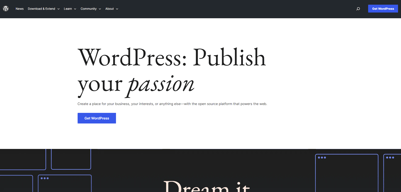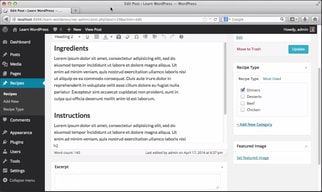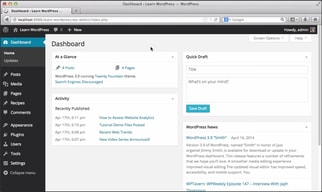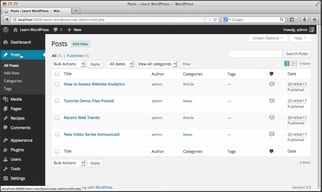

Unclaimed: Are are working at WordPress.org ?
WordPress.org Reviews & Product Details
WordPress is arguably the most popular open-source, cloud-based content management system based on PHP and MySQL designed to help small to large businesses create, manage and publish content for websites. The customizable solution allows enterprises to use plugins, widgets, and themes to simplify web creation and design. Top features allow users to upload and store multimedia content, auto-save progress, and restore critical data.
| Company | Automattic |
|---|---|
| Year founded | 2005 |
| Company size | 1001-5000 employees |
| Headquarters | Remote |
| Social Media |


( 1 )
| Capabilities |
|
|---|---|
| Segment |
|
| Deployment | Cloud / SaaS / Web-Based, Desktop Linux, Desktop Mac, Desktop Windows, On-Premise Linux, On-Premise Windows |
| Support | 24/7 (Live rep), Chat, Email/Help Desk, FAQs/Forum, Knowledge Base, Phone Support |
| Training | Documentation |
| Languages | English |
WordPress.org Pros and Cons
- WordPress.org is free!
- There are thousands of themes, plugins, and widgets to choose from
- You have complete control over the functionality and aesthetic of your website.
- There’s an active community with plenty of self-help guides and documentation available online.
- WordPress.org boasts powerful blogging features and SEO functionality.
- At least with older versions of WordPress, the design editor comes with a steeper learning curve.
- With any open-source software, you need to find your own hosting, which can seem daunting at first if you’re new to website creation.






Compare WordPress.org with other popular tools in the same category.

I was a wordpress developer, and I served more than 100+ clients website using wordpress. So after masively using wordpress I have lots of points to tell you why I like wordpress most, a) I am a software engineer I know how to build a website via coding but sometimes due to lack of time wordpress is the best solution for this. b) Scalibility, I can scale up my wordpress website. c) Responsive design themes & usefull plugins support. d) Very ease to build a complete website without coding.
I dont see any points for disliking wordpress till now. But during serving my clients I faced only one problem that is customization of custom features in wordpress.
There are lots of problems where I got the tons of help using wordpress. 1. First and foremost help is the store creation using woo-commerce in wordpress. 2. I can create any genres of website to serve my clients for example Restaurant, fitness, online ecommerce stores etc.. 3. Main thing is there are lots of platform which directly give access to integrate with wordpress which help me a lot to integrate other services e.g. hubspot, salesforce, slack, aws etc.. These are keys bennifits which I am getting from wordpress. And there are lot more features also wordpress provides those are, 1. Easy to create a website using elementor. 2. Easy to integrate any services by configuring the plugins, 3. SEO friendly. 4. Leads generation using wordpress forms.
Easy to use and very flexible and scalable.
It's hard for less experienced users to determine the good plugins from the bad ones on the repository.
Using WordPress has allowed me and my company to deliver amazing websites with a great cost-benefit relation. We also realized that developing with WordPress allows the project to be ready much faster than if we code from scratch or use other frameworks. Our clients as the website end-users also love the dashboard.
Free with lots of ways to enhance it through plugins and themes.
Since it the most widely used platform out there - every hacker is gunning for your site.
Ease of use - they are always trying to make it better.
We love the fact that we could install WordPress.org onto our own virtual machines. While there was no customer support, the fact that it is open source makes it easily available, with numerous resources.
The need to constantly update the plugins.
With WordPress.org, we were able to securely host an up-to-date, functionnal ecommerce platform.
WordPress is the most popular CMS today that is open source. In other words, one just needs a hosting space to launch a website. There are tons of free themes and plugins to begin with. Just because they are free does not mean they are not powerful or effective. The concept here is let the startups and small businesses start with the least cost. Once they grow up and start generating revenue, then go for the paid themes and plugins. In other words, I will like to see developers of themes and plugins be rewarded while creating increased value for the audience of my website. The philosophy of open source WordPress.org seems to follow this. If you are a developer, then sky is the limit. Apply your coding skills and generate something unique and innovative!
Being PHP based, there are limitations that comes with the PHP language. Given the thrust like of headless WordPress these days, many of the shortcomings are gradually addressed.
We use WordPress for launching all our websites/online stores. We use free themes and plugins extensively while also going for some paid ones if there is a budget or makes business sense. Not only our websites built with WordPress cost effective but also incorporates latest tools and technologies, thanks to an army of developers associated with this open source project.
Opensource and easy to implement with affordable hosting.
Customization part is little difficult for few implementations.
Easy to create profrssional landing pages
WordPress.org is open-source software thats easy to use to create a beautiful website, blog, or app. All our website development is done with WordPress as it enables us to produce high Google ranking websites.
The support community is amazing for WordPress.org, as a result its a pleasure to use.
Security services making WordPress.org website secure now and for the future.
WordPress is a great tool to build websites and blogs without code. Using Elementor, website development is easy with drag and drop features. Variety of plugins ease tasks like SEO.
Website speed can suffer with too many plugins, and some time managing website security is difficult.
No coding is required when developing website and blog using WordPress. Very good WordPress community support and regular updates of WordPress makes more features available to use.
The things i like about WordPress is im able to build any kind of website that is Simple or large E-Commerce websites can built easily without doing any kind of coding.It has lots of plugins that can be used based on requirements From SEO to Notification Sender it has all the Plugins that are very easy to integrate with WordPress with just one click for building im using the elementor which makes my work more easier by simple drag and drop i can build the website.
There are a few things i dislike about the WordPress are it needs to updated regularly while updating sometimes sites gets lag and becomes slow which need to be improved and also WordPress Should restrict unsafe plugins with its internal security.
With WordPress there is no code required to build the website.It was very easy to learn and Simple to use im able to built more than 15 websites using WordPress and there are lot of Themes available in WordPress with a simple install of the theme based on our requirements 90%b of the websites is done with Theme Builders like Elemntor we can build the site very fastly and that to in responsive. it has all the features in the form of plugins that can installed with one click.
With the WordPress im able to build websites very easily without using any code. the best part is it that by simply using Drag and Drop we can abe to build the website using Elementor. It has of lot of plugins that are easy to integrate and use for any feature we want it is available in the form of plugins and also it has thousands of Theme templates by Simply applying the theme website can be done in very little time.
There is nothing to dislike in WordPress as a WordPress developer I believe it was a perfect tool.the only thing disappointing was when we use more number of plugins the websites gets slow.
With WordPress Im able to build large e-commerce websites also very easily without doing any code simply by using the theme builder plugins like Elemntor and more over I can simply make a website in very less time and a responsive website can be done easily and WordPress satifes all my clients needs. and Anyone can understand WordPress so easily with its regular updates of WordPress the websites are very safe.






